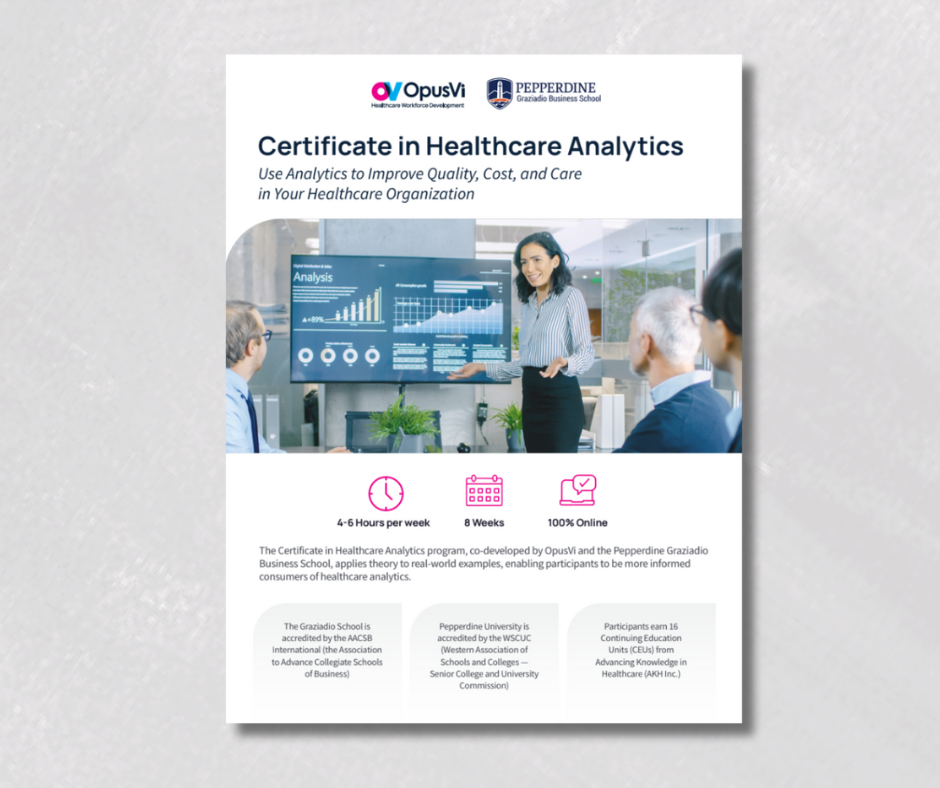
Certificate in Heroic Leadership in Healthcare
Online Certificate
Designed for all healthcare professionals, this program provides you with an in-depth accounting of your lives as leaders. Over the course of 8 weeks, world-renowned author Chris Lowney and senior executives in healthcare and leadership will bring clarity into your everyday lives, strengthen your capacity to connect with co-workers, teams, and patients, and make deep connections between personal purpose and workplace mission.
We work with organizations to retain and upskill their healthcare professionals in interpreting complex data sets and applying evidence-based analytics to inform critical decisions, creating clear pathways for career growth and mobility within the workforce.
Participants of the Certificate in Healthcare Analytics will learn to ask the right questions, evaluate data collection schemes, interpret complex data sets from various sources, and assess their results to make better-informed, evidence-based, and data-backed decisions enterprise-wide. The program is led by expert instructors with healthcare experience to ensure student success and cohort-based to encourage knowledge sharing and networking with peers. In only eight weeks, participants will become empowered to leverage healthcare analytics in their organization, influence important decisions, and achieve better results.
Duration:
Min Cohort:
Partner:

In Healthcare, Good Decision-Making Can Save Lives
The decision healthcare professionals make every day directly impact the well-being and lives of patients. Therefore, mistakes need to be minimized and the accuracy of decision-making is critical. In order to make optimized, evidence-based decisions to positively impact quality, cost, and care outcomes, healthcare professionals in both clinical and non-clinical roles — in all fields of care, not just in healthcare informatics departments — must rely on data.
The Certificate in Healthcare Analytics program, co-developed by OpusVi and the Pepperdine Graziadio Business School, applies theory to real-world examples, enabling participants to be more informed consumers of healthcare analytics.
This course focuses on decision intelligence: Computers can do all of the math for us now, but decision-makers must understand and adequately represent the problem, and identify the outcome that matters most.
95%
of surveyed graduates would recommend or strongly recommend this course to other current or aspiring leaders

98%
agreed that the content is objective, current, scientifically sound, and free of commercial bias
Collaborative learning in groups of 10+
with content and learning objectives that are relevant to their leadership development needs.16 CEs:
are awarded upon graduation.Learner FAQs
Shared Common Competencies
- Leadership
- Communication
- Quality and Patient Experience
- Mental Health, Substance Abuse
- Resilience
- Cultural Engagement
Specialty Areas Supported
Unit-Specific Pathways
- MedSurg-Tele
- Neonatal Intensive Care Unit (NICU)
- Acute Rehabilitation Unit (ARU)
- Intensive Care Unit (ICU)
- Emergency Room (ER)
- Labor & Delivery (L&D)
- Mother Baby Care (MBC)
- Operating Room (OR)
- Cath Lab
- Hospice
- Behavioral Health
- Critical Access Hospitals
Specific MedSurg Competencies
- Surgical Care
- Integumentary
- Respiratory
- Hematology
- Cardiovascular
- Gastrointestinal
- Renal
- Endocrine
- Neurological
FAQs
We are your partners from start to finish. View this FAQ for more information on who brings what to the table.
Curriculum
- Unit 1: Introduction to Descriptive Analytics
- Unit 2: Making Inferences and Practical Probability Theory
- Unit 3: Relationships Amongst Variables: Introduction to Correlation and Regression
- Unit 4: Multiple Regression
- Unit 5: Forecasting
- Unit 6: Framework for Decision-Making
- Unit 7: Finding Optimized Solutions in Healthcare, Part 1
- Unit 8: Finding Optimized Solutions in Healthcare, Part 2
The following themes — and more — will be covered in the program:
- Avoiding data biases and understanding data constraints
- Using data to identify trends, be proactive, and make predictions
- Understanding correlation
- Forecast future demand for services
- Measure numbers that drive action
- Probability
- Population parameters
- Regression analysis
- Inferential statistics
Outcomes
Participants of the Certificate in Healthcare Analytics for Decision-Makers will earn the following skills:
- Ask the correct questions prior to healthcare data collection and analysis, and search for possible alternative explanations upon completion
- Identify biases that may corrupt the decision-making process and develop mechanisms for avoiding those biases
- Use spreadsheets to model mathematics
- Understand practical statistical models that can be used to forecast the future
- Identify significant group differences and gauge the practical value of those differences
- Create rational frameworks to identify, embrace, integrate, and mitigate risk in the decision-making process
- Understand mathematical theories of optimization used to determine the best solutions to perplexing problems
- Create accurate, compelling, and convincing presentations to ensure implementation of analysts’ recommendations
- Think critically about healthcare issues and use an integrated approach when making decisions, leveraging expertise in all substantive areas
Minimum Cohort Size for the Program
Our programs are designed for engaging, career-focused learning in groups of 10 or more. Each participating organization must enroll a minimum of 10 learners to launch a cohort. This format encourages collaboration, shared learning and organizational impact—ensuring your team moves forward together.
Who should take this program?
-
Whatever your role is in healthcare or analytics, you are sure to be exposed to a plethora of data in your career. Understanding data concepts at a fundamental level is essential to discerning what important questions can and can’t be answered using data in order to make more educated, evidence-based decisions.
This program is ideal for consumers and producers of healthcare analytics data. It was designed for current and prospective decision-makers who are interested in gaining a working knowledge of the topic through participating in a flexible and comprehensive online course, rather than gaining the in-depth knowledge a degree in the field would offer.
Groups that might especially benefit from this program are:
- Leadership and business developers looking to expand business impact
- Administrative staff who are in charge of making operational decisions and financial decisions
- Analysts from outside of healthcare or recent graduates who wish to learn more about analytics in a healthcare context
- Healthcare analysts looking to refresh or expand their knowledge
- Clinicians who want to transition from the bedside into the administrative world or an operations role
You’ll be most successful in this program if you:
- Have had exposure to statistical concepts and want some practical experience applying them in a healthcare context in a safe environment and/or
- Are somewhat familiar research methods
- Want to apply a level of rigor to make sure you are making the best decisions applying this data
Key Program Features
- Dynamic, engaging video content
- Interactive lessons with practical, hands-on exercises
- Collaborative discussions
- Job aids and takeaways for continuous reference
- Networking opportunities
- Curriculum covers specialized marketing concepts, applied in a healthcare context
- Modularization allows flexibility and helps manage workload
Can I Enroll as an Individual?
Our programs are designed for group-based learning with a minimum of 10 participants. While we don’t offer individual enrollment at this time, you’re welcome to organize your own group of 10 or more peers to start a cohort. You can also speak with your employer about enrolling your team through your organization.

Download our brochure.

About the Pepperdine Graziadio Business School
For the last 50 years, the Pepperdine Graziadio Business School has challenged individuals to think boldly and drive meaningful change within their industries and communities. Dedicated to developing Best for the World Leaders, the Graziadio School offers a comprehensive range of MBA, MS, executive, and doctoral degree programs grounded in integrity, innovation, and entrepreneurship. The Graziadio School advances experiential learning through small classes with distinguished faculty that stimulate critical thinking and meaningful connection, inspiring students and working professionals to realize their greatest potential as value-centered leaders.
Pepperdine University is a private institution founded in 1937. It has a total undergraduate enrollment of 3,604. Its setting is suburban, with the Malibu campus spanning 830 acres. In the 2019 edition of Best Colleges, Pepperdine University ranked 47 on the list of National Universities. The Pepperdine Online MBA ranks No. 12 for the Top Online MBA in the Princeton Review in 2020.
The average manager spends 15 days chasing paperwork each year.
The traditional method for tracking & managing competencies doesn’t just lead to the big paper chase, it can result in unnecessary errors. Errors that will be caught on survey day. Errors that may be the difference between life and death.
It’s time to get One Step Ahead with our digital competency management program.


An organization of 50 employees can save 1,500 sq ft of storage space.*
*According to US Averages


